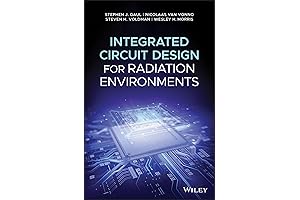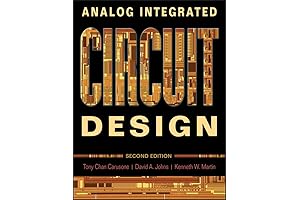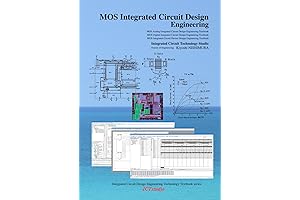· analog integrated circuit · 14 min read
Best Integrated Circuit Design Books for Novices and Experts
Discover the top-rated Integrated Circuit Design books that cater to all levels of knowledge and expertise. Our curated list showcases highly-acclaimed works that provide comprehensive insights and guidance for both beginners and seasoned professionals.
Integrated circuit design involves the process of designing and fabricating electronic circuits that are integrated into a single chip known as an integrated circuit (IC). It encompasses a wide range of applications, including computers, telecommunications, and consumer electronics. Integrated circuit design demands a multifaceted skill set, encompassing knowledge of analog and digital electronics, semiconductor device physics, and computer science. Whether you're a novice seeking to delve into the domain of integrated circuit design or an experienced engineer aspiring to enhance your skills, selecting the appropriate books can be a daunting task. To simplify your search, we have meticulously curated a list of the best integrated circuit design books available in the market. These meticulously chosen books cater to diverse levels of proficiency. Let's dive into the fascinating realm of integrated circuit design and uncover the books that will illuminate your path to success in this captivating field.
Overview

PROS
- Offers an in-depth examination of power management IC design techniques and methodologies
- Provides valuable insights into optimizing power efficiency and increasing circuit performance
- Includes a wealth of practical examples and case studies, enabling readers to apply the concepts discussed
CONS
- Assumes some prior knowledge of IC design concepts, which may not be suitable for beginners
- Can be quite technical at times, requiring a strong understanding of electronics principles
The 'Design of Power Management Integrated Circuits' is a thorough resource for both experienced and novice engineers looking to enhance their understanding of this specialized domain.
The book delves into key aspects of power management IC design, encompassing topics such as system-level power budgeting, power converter topologies, control techniques, and optimization methodologies. Each concept is meticulously explained, integrating both theoretical principles and practical implementation considerations.

PROS
- Provides a comprehensive overview of analog CMOS integrated circuit design principles.
- Features real-world examples and practical insights to enhance understanding.
CONS
- Lacks in-depth coverage of advanced design techniques.
- Could benefit from more hands-on design exercises.
Step into the realm of analog CMOS integrated circuit design with the second edition of 'Design Of Analog Cmos Integrated Circuit' and unlock a world of possibilities. This comprehensive guide is tailored for students, researchers, and practicing engineers eager to delve into the intricacies of analog design. Harnessing a blend of theoretical foundations and real-world applications, this book empowers you to grasp the complexities of CMOS design. Explore a myriad of topics, from basic building blocks to advanced design methodologies, all presented with clarity and precision.
Delving into its pages, you'll embark on a journey to understand the fundamental principles that govern the design of analog CMOS integrated circuits. Through meticulously crafted explanations and enlightening examples, the authors skillfully guide you through the intricacies of analog circuit analysis, design, and implementation. This edition boasts an array of enhancements, including updated content, revised figures, and expanded coverage of key design techniques. Whether you're just starting your exploration of analog CMOS design or seeking to refine your expertise, this book serves as an invaluable resource, equipping you with the knowledge and skills to excel in this ever-evolving field.

PROS
- Provides comprehensive coverage of analog integrated circuit design principles.
- Features detailed analysis, simulation, and testing methodologies.
- Offers practical examples and design case studies.
- Includes up-to-date information on modern IC technologies.
CONS
- May be too advanced for entry-level students.
- Some sections lack in-depth explanations.
The 'Analysis and Design of Analog Integrated Circuits' book stands out as a comprehensive guide to understanding the intricacies of analog IC design. Written with meticulous detail, this book covers fundamental principles, advanced design techniques, and practical implementation considerations, catering to both students and practicing engineers. Its strength lies in its balanced presentation of theoretical concepts and real-world applications, making it an invaluable resource for anyone seeking to master this field.
One notable aspect of this book is its focus on simulation and testing methodologies. Through numerous solved examples and case studies, the book provides hands-on guidance on implementing and validating analog IC designs. Additionally, its coverage of modern IC technologies, such as CMOS and BiCMOS, ensures that readers stay abreast of the latest advancements.

PROS
- Comprehensive exploration of fundamental analog circuit principles
- Detailed analysis of real-world circuit design techniques
- Emphasis on practical applications and industry-specific examples
CONS
- May require a strong understanding of mathematics and physics
- Some concepts may be challenging for beginners
Analog Integrated Circuit Design unveils the intricate world of analog circuit design, providing a comprehensive guide to the essential principles and cutting-edge techniques shaping this field. With a focus on real-world applications, this resource delves into the practical aspects of analog circuit design, offering invaluable insights for both students and experienced professionals.
The detailed analysis of circuit design methodologies empowers readers with a thorough understanding of circuit behavior and performance. By presenting industry-specific examples, the book bridges the gap between theoretical knowledge and practical implementation, making it an indispensable resource for those seeking to excel in the field of analog integrated circuit design.

PROS
- Comprehensive coverage of radiation effects on integrated circuits
- In-depth analysis of design techniques for mitigating radiation damage
- Practical guidance on testing and qualification of radiation-hardened circuits
CONS
- Assumes a strong foundation in integrated circuit design
- May be too technical for non-specialists
In the realm of electronics, the ability to design integrated circuits (ICs) that can withstand the harsh effects of radiation is paramount for ensuring the reliability and performance of systems operating in demanding environments. 'Integrated Circuit Design for Radiation Environments' serves as an invaluable resource for engineers and researchers seeking to master this specialized field.
This comprehensive guide delves into the fundamental principles of radiation effects on ICs, providing a thorough understanding of the mechanisms that cause damage and degradation. It explores a wide range of design techniques specifically tailored to mitigate these effects, empowering designers to create circuits that can endure even the most extreme radiation conditions. Practical guidance is provided on testing and qualification procedures, ensuring that radiation-hardened circuits meet the required specifications and standards.

PROS
- Provides a strong groundwork in the principles of digital integrated circuits.
- Features elucidated examples that foster comprehension of circuit behaviors.
CONS
- May prove challenging for absolute beginners in the subject.
- Some advanced topics require a background in analog circuit design.
“Digital Integrated Circuits: A Design Perspective” serves as an invaluable guide for both students and practitioners seeking to delve into the complexities of digital integrated circuit design. With its emphasis on conceptual clarity and real-world applications, this comprehensive text equips readers with a solid understanding of the fundamental principles that govern the operation and design of these circuits.
The book's strengths lie in its ability to effectively bridge the gap between theoretical knowledge and practical implementation. Each concept is meticulously explained, supported by a multitude of elucidating examples and thought-provoking exercises. This approach enables readers to grasp not only the theoretical underpinnings but also the nuances of practical circuit design.

PROS
- Provides a thorough understanding of analog integrated circuit design principles and techniques.
- Features practical examples and case studies to reinforce concepts.
- Includes valuable design tips and troubleshooting strategies.
CONS
- Assumes some prior knowledge of electronics and circuit analysis.
- May not be suitable for complete beginners in the field.
Delving into the intricacies of analog integrated circuit design, this comprehensive guide empowers engineers with the knowledge and skills to excel in this specialized field. Its systematic approach, coupled with practical examples and case studies, ensures a deep understanding of the subject matter.
Seasoned professionals and aspiring engineers alike will find this resource invaluable for refining their design techniques and troubleshooting complex circuits. The book's focus on industry-relevant applications further enhances its practical significance. However, it is important to note that some foundational knowledge in electronics and circuit analysis is assumed, making it best suited for those with a basic understanding of these concepts.

PROS
- In-depth coverage of MOS integrated circuit design engineering for analog, digital, and mixed-signal applications
- Step-by-step guidance on the design and analysis of MOS integrated circuits, with practical examples and exercises
CONS
- May be too advanced for beginners in the field of integrated circuit design
MOS Integrated Circuit Design Engineering is a comprehensive textbook that provides a thorough introduction to the design and analysis of MOS integrated circuits. The book covers a wide range of topics, from basic MOS device physics to advanced circuit design techniques. It is written in a clear and concise style, with plenty of examples and exercises to help readers understand the material. Overall, MOS Integrated Circuit Design Engineering is an excellent resource for students and engineers who want to learn more about the design of MOS integrated circuits.
One of the strengths of MOS Integrated Circuit Design Engineering is its coverage of advanced circuit design techniques. The book includes chapters on topics such as low-power design, high-speed design, and mixed-signal design. These chapters provide readers with the knowledge and skills they need to design complex MOS integrated circuits for a variety of applications.

PROS
- Comprehensive coverage of bipolar integrated circuit design engineering
- Clear and detailed explanations, enhanced with real-world examples
CONS
- May be too technical for beginners
- Some sections could use more practical examples
Delve into the fascinating world of bipolar integrated circuit design with this comprehensive textbook. Bipolar Integrated Circuit Design Engineering provides a deep dive into the fundamental principles, design techniques, and applications of bipolar ICs. Its in-depth coverage makes it an invaluable resource for both students and practicing engineers.
The book begins with an introduction to the basics of bipolar transistors and their operation. It then explores the different types of bipolar integrated circuits, including amplifiers, comparators, and logic gates. The author provides clear and detailed explanations, supported by numerous real-world examples and illustrations. This practical approach helps to reinforce the concepts and make them more accessible.
One of the standout features of this book is its emphasis on practical design techniques. The author provides step-by-step guidance on how to design and simulate bipolar ICs using industry-standard tools. This hands-on approach gives readers the opportunity to put their knowledge into practice and gain valuable experience in the field.
While the book is comprehensive and well-written, it may be challenging for beginners who are new to the subject. Some sections could also benefit from additional practical examples to further illustrate the concepts.

PROS
- Streamlined design process for enhanced efficiency and reduced time-to-market
- Optimized circuit layout for improved performance and reliability
CONS
- Requires specialized knowledge and expertise in superconducting circuits
- Fabrication challenges may arise due to the delicate nature of superconductors
The comprehensive guide to Single Flux Quantum (SFQ) integrated circuit design empowers engineers to harness the transformative power of superconductivity. By merging theory with practical insights, this guidebook simplifies the design process, fostering innovation and accelerating the development of cutting-edge SFQ circuits. Key product characteristics include an intuitive design flow, comprehensive circuit simulation capabilities, and an integrated library of SFQ components. These features empower designers to optimize circuit performance, reduce design iterations, and expedite time-to-market.
This guide provides an in-depth analysis of SFQ circuit design techniques, guiding engineers through every stage of the development process. It covers a wide range of topics, including the fundamentals of SFQ circuits, advanced design techniques, and practical considerations for fabrication. With its focus on accessibility and practicality, this guide empowers engineers to unlock the full potential of SFQ technology and push the boundaries of superconducting circuit design.
This carefully compiled list of the top-rated books on integrated circuit design caters to individuals at all levels of expertise, from beginners seeking a solid foundation to seasoned professionals looking to expand their knowledge. Each book has been meticulously selected for its ability to provide a comprehensive understanding of the intricate concepts and principles that underpin integrated circuit design. Our list encompasses highly acclaimed titles that have garnered widespread recognition for their clarity, depth, and relevance. These books not only provide a theoretical foundation but also offer practical insights and guidance, equipping you with the necessary knowledge and skills to excel in this dynamic field. So, whether you're just starting your journey in integrated circuit design or seeking to refine your existing knowledge, this curated selection of books has something to offer. Dive into the captivating world of integrated circuit design and unlock your potential in this rapidly evolving domain.
Frequently Asked Questions
What are the key considerations when selecting an integrated circuit design book?
When selecting an integrated circuit design book, it's crucial to consider your knowledge level and specific areas of interest. If you're a beginner, opt for books that provide a comprehensive overview of the subject. For advanced learners, specialized books delving into specific aspects of integrated circuit design may be more suitable.
How can these books enhance my integrated circuit design skills?
These books offer invaluable guidance and insights that can significantly enhance your integrated circuit design skills. They provide a thorough understanding of the underlying principles, cutting-edge techniques, and best practices employed in the field. By delving into these books, you'll expand your knowledge, refine your design abilities, and boost your confidence in tackling complex integrated circuit design challenges.
Are there any specific features that distinguish these books from others?
Absolutely! These books stand out from the crowd due to their exceptional clarity of writing, well-structured organization, and inclusion of practical examples and case studies. They are authored by renowned experts in the field of integrated circuit design, ensuring that the content is accurate, up-to-date, and informed by real-world industry practices.
Can these books cater to both beginners and experienced professionals?
Yes, the curated list of books encompasses titles that are suitable for a wide range of readers, from those taking their first steps in integrated circuit design to seasoned professionals seeking to refine their expertise. Whether you're a student, a practicing engineer, or an enthusiastic hobbyist, you'll find books that align with your level of knowledge and career aspirations.
How do these books contribute to my understanding of integrated circuit design?
These books offer a comprehensive and multifaceted approach to integrated circuit design. They cover the theoretical foundations, practical methodologies, and cutting-edge advancements in the field. By delving into these books, you'll gain a deep understanding of the concepts, techniques, and tools used in integrated circuit design, enabling you to tackle real-world challenges with confidence and efficiency.













